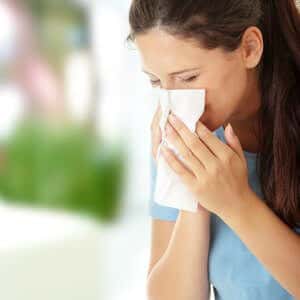
Breathing is basic. Most of the time we take it for granted. But if your nose is congested and your sinuses are stopped up due to seasonal allergies, you are miserable.
Seasonal Allergies Affect Your Brain:
For one thing, your head feels as if it’s full of cotton. Studies have found that people suffering from allergic rhinitis frequently experience sleep difficulties, fatigue, poor concentration, drowsiness, irritability, delayed reaction times, memory problems, and cognitive impairment (Hartgerink-Lutgens et al, Clinical and Experimental Allergy, April 2009; Trikojat et al, Clinical and Experimental Allergy, April 2017). When you are in the middle of an allergy attack, it is hard to drive safely even if you are not sneezing (Vuurman et al, Allergy, July 2014). Making decisions or operating other kinds of machinery can also be problematic.
The Trouble with Antihistamines:
Paradoxically, although antihistamines are a mainstay for treating seasonal allergies, older antihistamines can also cause drowsiness, delayed reaction times, sedation, and cognitive impairment (Inami et al, Human Psychopharmacology, May 2016). Even the so-called second-generation non-sedating antihistamines that are so heavily advertised to consumers (for example, cetirizine, fexofenadine, levocetirizine or loratadine) may not be as benign as drug companies would have you believe. When given in doses that are adequate to relieve symptoms, some of these non-sedating antihistamines, particularly cetirizine, may also make people drowsy and impair performance (Hetland & Carr, Annals of Pharmacotherapy, April 2014).
Research has shown that driving skills may be affected by both older and the newer antihistamines. A massive study conducted for the National Highway Traffic Safety Administration discovered that driving while drowsy–no matter what the cause–increased the risk of a crash or near crash by four to six times.
Are Allergies Truly Seasonal?
Physicians often think of allergies as more of a temporary nuisance than a life-threatening condition. But we now realize that impairment poses huge risks if people are driving. And allergy symptoms don’t just occur in the spring and fall, when pollen is in the air. Nowadays many folks are congested all year long.
At last count, 50 million people are sensitive to things like dust mites, cat dander, cockroaches, mold spores, and pollens from oak, elm, and maple trees as well as ragweed and rye, blue, and Bermuda grasses. Symptoms include nasal stuffiness, runny nose, itching, sneezing, and coughing.
Chronic sinusitis, which may develop as a consequence of allergies, affects more than 30 million people. And asthma, which can be life threatening, often has an allergic and inflammatory component.
What is scariest about these statistics is that they keep going up. No one knows why, but it appears that more people are suffering than ever before.
What Can You Do About Your Allergies?
Allergies don’t get the respect they deserve. When you complain about your congestion, most friends and family members will barely sympathize. But allergies can slow you down and make you dangerous behind the wheel. Finding the right treatment to ease your symptoms without causing worse problems is a challenge. Combining several options, including environmental control, may be the most effective solution for solving this common problem.
- Use a HEPA-type air filter and a dehumidifier to remove allergens from the air you breathe and make the environment inhospitable for the three Ms of allergy–mold, mildew, and mites.
- Get a high-quality vacuum cleaner that won’t spew dust and dirt back into the air. Miele models rank high on our list.
- Wash your nasal passages with saline. A neti pot will help.
- Consider an herbal treatment such as stinging nettle (Urtica dioica) or butterbur (Petasites hybridus). Men with prostate enlargement may find nettles especially helpful since some OTC allergy medicines may make this condition worse.
- The natural products quercetin and bromelain may help stabilize mast cells and prevent histamine release.
- Cromolyn (NasalCrom) is an OTC remedy that also stabilizes mast cells. It should be used preventively before exposure to allergens occurs. Cromolyn does not cause drowsiness.
- Oral antihistamines can control symptoms, but they may also make you dangerous on the highways. Even nonsedating products may interfere with driving ability. One of the newer antihistamines such as loratadine (Alavert, Claritin), cetirizine (Zyrtec), fexofenadine (Allegra) or levocetirizine (Xyzal) is preferable to an old-fashioned drug such as diphenhydramine (Benadryl) or chlorpheniramine (Chlor-Trimeton).
- Among prescription allergy medicines, steroid nasal sprays offer the most effective symptom relief with a minimum of side effects. The cost is significant, since many are available only by prescription. One generic variety (flunisolide) is less expensive than brand-name prescription products. Budesonide (Rhinocort Allergy Spray), fluticasone (Flonase Allergy Relief) and triamcinolone (Nasacort Allergy 24HR) are available without a prescription.
- Pseudoephedrine can be surprisingly effective at controlling allergy symptoms. Beware of side effects such as insomnia, nervousness, high blood pressure, and irregular heart rhythms. Men with enlarged prostate glands should avoid pseudoephedrine since it can cause urinary difficulties. Although this is a non-prescription product, many pharmacies have limited access to it.
Revised 5/8/17

